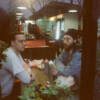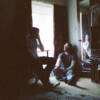Whitney – Small Talk
By Grayson Haver Currin
Small Talk—the fourth and unequivocally best and most affecting album by the Chicago duo Whitney—started before their third one, Spark, was even finished. Sometime in the summer of 2021, they were near El Paso, in the final days of making that record alongside producer Brad Cook. During a studio break, the three drove to the suburbs, got stoned, and played a few games of Topgolf. Over the years, Cook had become a trusted friend and collaborator. On the drive home, as the three were talking about the creative process, Cook turned off the stereo and offered an unexpected bit of advice: Whitney no longer needed him or, for that matter, any producer. Whitney had the vision and skill to make their own records—in fact, it turns out, to make their best one yet.
Julien Ehrlich and Max Kakacek sat with that conversation for nearly two years. In the months after Spark arrived, they finally decided to test it. They had written a new song called “Back to the Wind,” a strutting bit of sad soul, with drum machines and samples, much like they’d made their last batch. How would it sound, though, if they stepped back and played it in real time, with their friend and touring bandmate Ziyad Asrar simply engineering the session? It sounded, turns out, like vintage Whitney reborn, a cantering beat and gentle tremolo guitar moving like the life force that keeps you going after some upending bout of emotional torment. “I knew it all along” went its sweet little hook. Maybe Whitney had known it all along—that they could indeed do this themselves, that they alone could capture their enthusiasms and experiences in 11 incandescent songs given enough time and space. Small Talk is Whitney’s big, hard-earned expression of self-confidence.
Whitney’s sense of liberation arrived right on time, amid intense spells of professional and personal struggle. Spark was admittedly hard, the excitement they felt for its new electronic textures and structures wasn’t exactly reciprocated the way they’d hope it might be. And after a decade of being roommates and bandmates, first in Smith Westerns and then in Whitney, Ehrlich and Kakacek were finally preparing to move out of the same space and in with girlfriends who happened to share the same name. And then, well, they both got dumped in 2023, with Kakacek even getting the call around his birthday, weeks after Ehrlich started dating the woman who is now his wife. For a little while longer, they realized, they would remain roommates, if in very different emotional places. And so, they got to work at home on writing Small Talk, a record that exquisitely crystallizes all of those bittersweet feelings.
For years, Ehrlich’s dad, a drummer, had stockpiled salvaged recording gear in a barn that looked like a little airplane’s hangar in Newberg, Oregon, a small city near the forested banks of the Willamette River. Whitney had never really operated there, but it felt like the optimal space for the sort of sans-producer exploration that their experience with “Back to the Wind” proved they were ready to pursue. Ehrlich had left a tape machine there for a half-decade, and they knew they could rent anything else they needed in nearby Portland. In the summer of 2024, almost exactly three years after Cook said they no longer required his type, the pair installed themselves in Oregon for three weeks, assorted pals dropping by to add parts. The pace was leisurely but steady, Ehrlich and Kakacek no longer concerned they were wasting valuable studio space or money by trying to get a harmony or hook just so. Asrar engineered the whole thing. Together, they took the time to rediscover the core of their chemistry, of Whitney itself.
Small Talk, then, delights on two levels: There are instant classic Whitney songs here, tunes that tug at the same heartfelt melodic strings they’ve always pulled, and still other moments that speak to how much room they gave themselves to evolve. “The Thread” is pure Whitney pop, bright strings lifting the kind of groove and lick The Band might have favored on a perfect spring day. And there’s “Dandelions,” a cataract of musical pleasantry meant to sweep the sting of romantic disappointment downstream. It’s easy to imagine the song on an FM dial somewhere, bounding out of crusty old speakers between solo McCartney and Nashville Dylan.
But then there’s “Evangeline,” a moving picture of the neuroses that take charge when life lets us down. Concert snares and strings swell like a thrift-shop symphony during the second verse before fading into the distance, as Madison Cunningham steps forward to deliver the other half of this story. Whitney has never indulged such dynamics before, never so fully captured the push and pull of two hearts caught in longing and opposition. And though it details the difficulties of a long-distance relationship, “Won’t You Speak Your Mind?” finds Whitney at their most musically ebullient, locating the rhythmic and melodic space between a disco dancefloor and a yacht bandstand. It feels, like so much of Small Talk, effortless but expert, Ehrlich and Kakacek finally having worked enough to make their pop songs feel as natural as a smile or a frown.
“I’m going to try my best to survive in this place,” Ehrlich sings two minutes into Small Talk, his wondrous falsetto rising through strings like a light beam. This song, “Silent Exchange,” is a snapshot of a funeral, with Ehrlich and Kakacek peering out through bleary eyes to wonder what else there might be for them in this life, in this world. Ten songs later, during the twisting and audacious title track, Ehrlich sings from the imagined perspective of Kakacek’s grandmother, the caretaker for a husband who worked as a professional wrestler for decades. There is an optimistic weariness to her thoughts as she ponders “the feelings you hide to put on a show.” It’s hard not to picture these two old friends, still navigating life’s tandem pitfalls and possibilities by making music together.
This endurance culminates in closer “Darling,” perhaps the most striking and singular number in Whitney’s catalogue. It’s at first a breakup song about being hamstrung by a deeply damaging relationship. Just past the halfway point, however, a new beat emerges, with a flute melody floating above a strutting, triumphant rhythm. It’s a wordless, joyful coda, a final act of getting together with your buds to make music and, in doing so, breaking up with another’s expectations of who you should be. Whitney, in the end, has never sounded quite so free.



